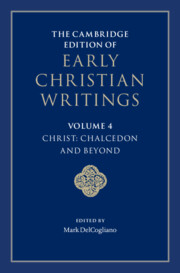Book contents
- The Cambridge Edition of Early Christian Writings
- The Cambridge Edition of Early Christian Writings
- The Cambridge Edition of Early Christian Writings
- Copyright page
- Contents
- Notes on Contributors
- Acknowledgments
- Note on the Texts and Translations
- Abbreviations
- Series Introduction
- Introduction
- Part I The Council of Chalcedon and Its Reception
- 1 Acts of the Home Synod at Constantinople (November 448):
- 2 Eutyches, Letter to Leo of Rome
- 3 Leo of Rome, Tome to Flavian of Constantinople
- 4 Acts of the Council of Chalcedon (October 451):
- 5 Leo of Rome, The Second Tome (Letter to Emperor Leo)
- 6 Timothy Aelurus, Petition to Emperor Leo
- 7 Timothy Aelurus, Against the Council of Chalcedon
- 8 Timothy Aelurus, Letter to Claudianus
- 9 Emperor Zeno, The Henotikon
- 10 Pseudo-Dionysius the Areopagite, Fourth Letter
- 11 Narsai, Metrical Homily on “the Word became Flesh” (John 1:14)
- 12 Narsai, Selections from the Metrical Homilies on the Nativity and on the Epiphany
- 13 Philoxenos of Mabbug, Letter to the Monks of Senoun (Selections)
- 14 Jacob of Serugh, Metrical Homilies on the Name “Emmanuel” and on How the Lord is Known in Scripture as Food and Drink
- 15 Jacob of Serugh, Metrical Homily on the Council of Chalcedon
- 16 Jacob of Serugh, Letter 14
- 17 Simeon of Beth Arsham, Letter on Bar Ṣawmā and the Heresy of the Nestorians
- 18 Emperor Justinian, Edict on the Orthodox Faith (Selection)
- 19 Acts of the Second Council of Constantinople (May–June 553):
- Part II Christological Perspectives after Constantinople II
- Suggestions for Further Reading
- Scriptural Index
19 - Acts of the Second Council of Constantinople (May–June 553):
Selected Proceedings and the Fourteen Canons
from Part I - The Council of Chalcedon and Its Reception
Published online by Cambridge University Press: 11 February 2022
- The Cambridge Edition of Early Christian Writings
- The Cambridge Edition of Early Christian Writings
- The Cambridge Edition of Early Christian Writings
- Copyright page
- Contents
- Notes on Contributors
- Acknowledgments
- Note on the Texts and Translations
- Abbreviations
- Series Introduction
- Introduction
- Part I The Council of Chalcedon and Its Reception
- 1 Acts of the Home Synod at Constantinople (November 448):
- 2 Eutyches, Letter to Leo of Rome
- 3 Leo of Rome, Tome to Flavian of Constantinople
- 4 Acts of the Council of Chalcedon (October 451):
- 5 Leo of Rome, The Second Tome (Letter to Emperor Leo)
- 6 Timothy Aelurus, Petition to Emperor Leo
- 7 Timothy Aelurus, Against the Council of Chalcedon
- 8 Timothy Aelurus, Letter to Claudianus
- 9 Emperor Zeno, The Henotikon
- 10 Pseudo-Dionysius the Areopagite, Fourth Letter
- 11 Narsai, Metrical Homily on “the Word became Flesh” (John 1:14)
- 12 Narsai, Selections from the Metrical Homilies on the Nativity and on the Epiphany
- 13 Philoxenos of Mabbug, Letter to the Monks of Senoun (Selections)
- 14 Jacob of Serugh, Metrical Homilies on the Name “Emmanuel” and on How the Lord is Known in Scripture as Food and Drink
- 15 Jacob of Serugh, Metrical Homily on the Council of Chalcedon
- 16 Jacob of Serugh, Letter 14
- 17 Simeon of Beth Arsham, Letter on Bar Ṣawmā and the Heresy of the Nestorians
- 18 Emperor Justinian, Edict on the Orthodox Faith (Selection)
- 19 Acts of the Second Council of Constantinople (May–June 553):
- Part II Christological Perspectives after Constantinople II
- Suggestions for Further Reading
- Scriptural Index
Summary
Emperor Justinian convened the second Council of Constantinople in 553 for the sole purpose of condemning the so-called Three Chapters – the person and writings of Theodore of Mopsuestia (d. 428), certain writings of Theodoret of Cyrrhus (d. ca. 466), and the Letter to Mari the Persian attributed to Ibas of Edessa (d. 457). Why was it deemed expedient to condemn these figures and their writings a century after their deaths? The reasons are complicated and remain debated by scholars. Justinian was at least partially motivated by fostering a reconciliation of anti-Chalcedonians with the imperial, Chalcedonian church. The condemnation of the Three Chapters by a joint council of Eastern and Western bishops was probably intended to demonstrate to anti-Chalcedonians that the charge of “Nestorianism” they leveled against the imperial church was groundless.
- Type
- Chapter
- Information
- The Cambridge Edition of Early Christian Writings , pp. 341 - 390Publisher: Cambridge University PressPrint publication year: 2022

